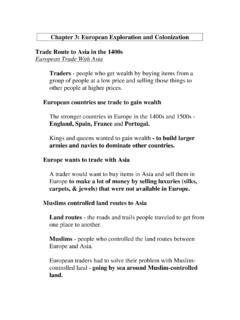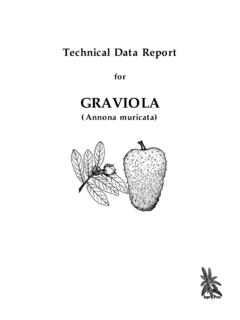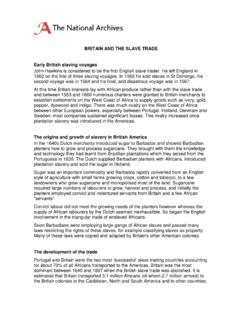Transcription of INCLUSIVE GROWTH - oecd.org
1 Agenda26 April 2018, Boulogne, AuditoriumWealth inequalities: measurement and policiesINCLUSIVE GROWTH OECD Auditorium 46 quai Alphonse le Gallo, 92100 Boulogne Billancourt 26 April 2018 This one-day conference brings together researchers, policy-makers and stakeholders from across the OECD to discuss the evidence on the nature of inequalities in the distribution of household wealth , their implications for society and the challenges for policy-makers that they raise. In recent years, wealth inequality has become the subject of increasing debate among policy-makers, the media, and the general public. This interest has come alongside the increasing availability of data on inequalities in wealth , including through the OECD wealth Distribution Database (launched in 2015 and recently expanded, and which now provides comparable estimates for 28 OECD countries), as well as other studies documenting long-term trends for different countries (including Piketty, 2014; Atkinson, 2015; Saez & Zucman, 2014; and Credit Suisse, 2017).
2 This conference will discuss the latest findings on the distribution of household wealth in OECD countries and beyond, and why these inequalities matter for both social and economic policy. The conference will also focus on some of the opportunities to improve these estimates further to provide the information needed by policy-makers. Growing attention to wealth inequalities has been driven in part by evidence of rising inequality in many OECD countries in recent years. Addressing this challenge is important, as stressed by the OECD report In it Together (OECD, 2015), which highlighted how rising income inequality can not only impact on social cohesion, but also harm economic GROWTH in the long-term. In the case of wealth , the argument has been made that high wealth inequality, through the generation of capital income, has the potential to deepen income inequality still further. The issues associated with wealth inequality go, however, well beyond the purely economic dimension, as wealth inequality is associated with high economic vulnerability, unequal political capital, and limited social mobility and equality of opportunity, particularly through the role of inheritances.
3 The afternoon sessions will therefore focus on the evidence available on the importance of inheritances, the role that tax policy can play in addressing these issues, and on the challenges associated with this approach, particularly in the context of globalisation and aggressive tax planning. Interested in attending? Write to us at to register. OECD Conference on wealth inequalities: Measurement and policies Agenda Registration and Coffee Opening session: Why does household wealth inequality matter? Chair: Martine Durand (OECD Chief Statistician, Director of OECD Statistics and Data Directorate) Keynote intervention: Gabriela Ramos (OECD Chief of Staff and Sherpa to the G20, Leader of the INCLUSIVE GROWTH Initiative) - Presentation Keynote speech: Sir John Hills (London School of Economics) - Presentation Session 1: What do we know about the distribution of household wealth in OECD countries and globally? The first session will look at the latest evidence on the distribution of household wealth , across OECD countries and beyond.
4 It will draw on the recently updated OECD wealth Distribution Database, as well as other sources including the Credit Suisse Global wealth Report and the World wealth and Income Database ( ), highlighting what we already know about the extent and nature of wealth inequality and where there are opportunities to further our understanding in future. Chair: Mark Pearson (Directorate for Employment, Labour & Social Affairs, OECD) Speakers: Martine Durand (OECD Chief Statistician, Director of OECD Statistics and Data Directorate) - Presentation Anthony Shorrocks (University of Manchester / World Institute for Development Economics Research) - Presentation Facundo Alvaredo (Paris School of Economics & Conicet) - Presentation Open the floor for discussion Coffee break Session 2: Improving estimates of the distribution of household wealth Compared with household income, the development of high quality estimates of the distribution of wealth has been a relatively recent development This session will therefore look at opportunities for developing these estimates further, including improving the estimation of the top end of the wealth distribution, broadening the range of assets that are considered, as well as the analysis of wealth alongside that of income and consumption.
5 Chair: Andrew Heisz (Statistics Canada) Speakers: Jesse Bricker (Federal Reserve Board) - Presentation Philip Vermeulen (European Central Bank) - Presentation Piotr Paradowski (LIS Cross-National Data Center in Luxembourg & Gdansk University of Technology) - Presentation Richard Tonkin (OECD Statistics and Data Directorate & UK Office for National Statistics)- Presentation Open the floor for discussion Lunch break Session 3: Inheritances and other wealth transfers The third session will focus on the impact of inheritances and other forms of wealth transfers, both directly on the distribution of wealth , and more broadly in terms of their impact on equality of opportunity and intergenerational mobility. It will look how the contribution of inheritances to household wealth has changed over time, as well as the question of who is receiving inheritances, both across and within generations. Chair: Bea Cantillon (Universiteit Antwerpen) Speakers: Conor D Arcy (Resolution Foundation) - Presentation Giovanni D Alessio (Banca d Italia) - Presentation Daniel Waldenstr m (Paris School of Economics) - Presentation Richard Benton (University of Illinois) Presentation Open the floor for discussion Coffee break Session 4: The role of tax policy: Opportunities and challenges This fourth session will ask what role tax policy could play in addressing the issues associated with wealth inequalities.
6 This includes the direct taxation of property and other forms of wealth , as well as inheritances; as well as through other mechanisms including the taxation of capital income and ensuring those on lower incomes have incentives to invest in human capital. The challenges that are associated with these approaches, particularly in a global economy with increasingly mobile capital, will also be considered. Chair: Luiz de Mello (OECD Economics Department) Speakers: David Bradbury (OECD Centre for Tax Policy and Administration) - Presentation Serena Fatica (European Commission, JRC) - Presentation Annette Alstads ter (Norwegian University of Life Sciences) - Presentation Alessandra Sanelli (Banca d Italia) - Presentation Open the floor for discussion Session 5: Next steps The final session will reflect on the issues raised during the course of the conference, and on what these imply for future OECD work, both in terms of improving the evidence base on wealth inequalities and their impacts, and the role of policy in addressing these issues.
7 Chair: Marco Mira D Ercole (OECD Statistics and Data Directorate) Panellists: Martine Durand (OECD Chief Statistician, Director of OECD Statistics and Data Directorate) Mark Pearson (Directorate for Employment, Labour & Social Affairs, OECD) Sir John Hills (London School of Economics) Concluding Remarks Mari Kiviniemi (OECD Deputy Secretary-General) Cocktail
















